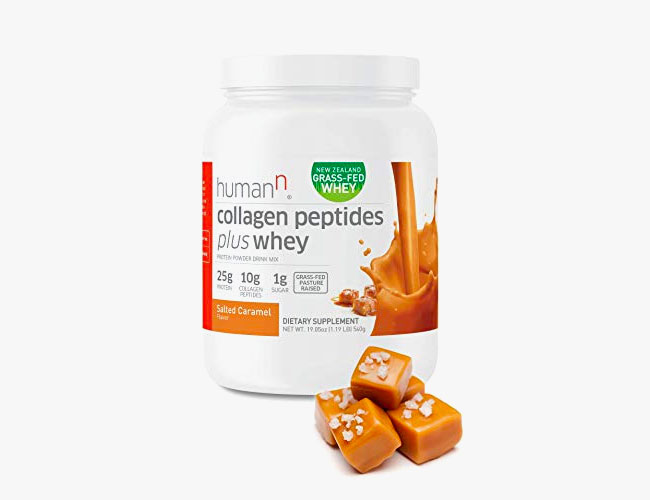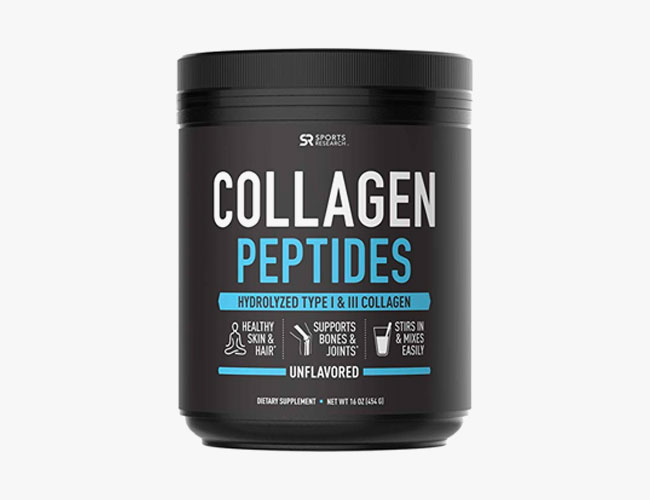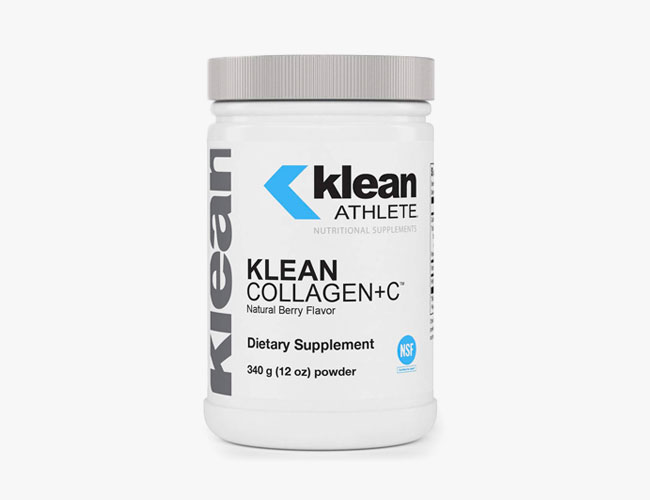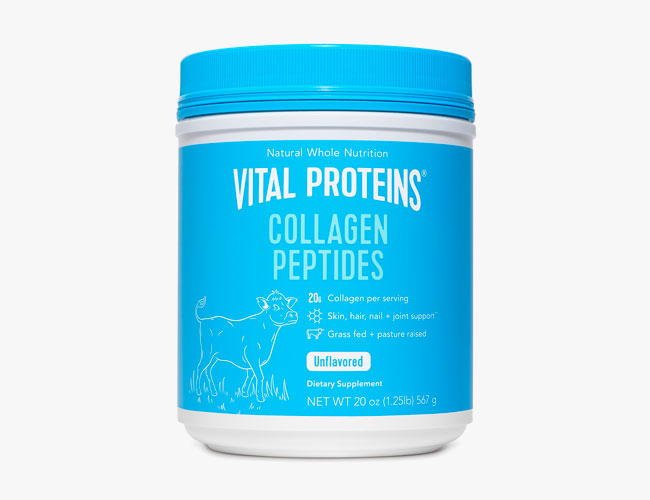To athletes, protein has always been paramount. But for years, it seemed that only mavens of the beauty world — plastic surgeons, dermatologists and estheticians — harnessed the powers of one particular protein: collagen. Known for smoothing the faces of Hollywood, collagen keeps skin looking younger and plumper via fillers and products. But as researchers realized the powerful protein’s abilities weren’t confined to aesthetics and extended to performance, athletic ability and bodily health, talk about collagen made its way to the locker room.
“Collagen is the most abundant protein in the human body,” explains exercise physiologist and nutrition scientist Stacy Sims, Ph.D. It’s a required building block not just for healthy nails, hair and skin, but also for bones, tendons and ligaments.
Soon, everyone from runners to bodybuilders hunting for an edge started scooping powder forms of collagen, and collagen peptide products filled the aisles of supplement stores. But what exactly are collagen peptides, how do they benefit the fit-minded and how should you work them into your regimen? We talked to three experts to learn more.
What are collagen peptides?
A little primer: Collagen peptides are the amino acids that are collagen’s building blocks. They contain eight of the nine essential amino acids, says Sims.
“When cooked, collagen proteins get denatured and turn into what we know as gelatin,” explains Elizabeth McNear, R.D., C.S.S.D., director of performance nutrition at Cal Athletics. “This process is taken one step further to create even smaller pieces, while still maintaining the same amino acid complex, known as collagen peptides.” She adds that unlike gelatin, this form doesn’t gel and is easier to digest.
How are they beneficial for athletes?
The strongest use case for collagen peptides pertains to joint health, notes Sims. “Ingesting collagen peptides can dampen inflammation and reduce pain associated with degeneration of cartilage,” she says. While the exact mechanism is still debated, collagen peptides appear to block the pain and inflammation associated with joint damage. Studies link the peptides to how healthy your tendons and ligaments are, notes McNear. “Since collagen peptides come from the tendons and ligaments of animals, we are able to use them for the synthesis of our own tendons and ligaments once digested,” she explains.
In fact, some research finds that consuming 10 to 15 grams of collagen along with small quantities of vitamin C (about 50 mg, the amount in an orange) around workouts can double collagen production in the joints, says Brian St. Pierre, R.D., C.S.C.S., director of performance nutrition at Precision Nutrition. The body requires vitamin C in order for specific amino acids to produce collagen.
By increasing collagen production, you build up a sturdy collagen structure in your body, strengthening connective tissue. “The stronger those connective tissues are — cartilage at joints, tendons, ligaments — the lower the risk for injuries,” McNear observes.
Does collagen help muscle recovery?
Not really. Though there are at least 16 different types of collagen, one in particular, type III, is associated with muscle, and that’s more from a structural point of view. Collagen isn’t a complete protein (meaning it doesn’t have each of the nine essential amino acids necessary in your diet), says St. Pierre, so it’s not particularly helpful for muscle protein synthesis.
It is helpful, however, for improving the health of your muscular support system and structures — those aforementioned tendons, ligaments and connective tissue, says McNear.
Should you take it before or after a workout?
Depends on your goals. Collagen has an anabolic (read: muscle-building) effect with food, says Sims, so to gain mass, have collagen after your workout. “You need to do some kind of stress to the muscle and tendons to create the feedback for repair in which collagen is stimulated,” she explains.
Looking for connective tissue health or repair? Consider supplementing pre-workout. Studies show that an hour before exercise, in conjunction with vitamin C, supplementation improves the body’s collagen synthesis, especially during the post-workout recovery period, says McNear. This could make joints healthier, stronger and more resilient to injury, St. Pierre says.
That said, don’t stress too much about timing. “Simply including 10 to 15 g in [your] daily intake is likely beneficial regardless of timing,” he notes.
What should you look for when purchasing?
You want a simple product with minimal added ingredients, says St. Pierre. Check the type of collagen the product has, too. “Type 1 and 3 collagens are generally used to support bones and skin health. Type 2 is used to support joints.” The amount per serving matters, too. Studies have shown positive benefits with 10 to 15 g doses — sometimes even just 5 g. Check if the supplement contains vitamin C, too. If it doesn’t, you can pair your peptides with an outside source to maximize benefits, McNear says.
Lastly, look for a confirmation of third-party testing — it ensures you’re truly getting what’s listed on the label, she says.
Should collagen peptides be combined with my protein powder?
If you’re seeking an anabolic stimulus — building muscle to help build your bones — then yes. Just remember: “Peptides on their own will not promote muscle protein synthesis,” Sims stresses.
It also might just be easier — for convenience and consistency’s sake — to blend the two (St. Pierre, for example, does), but it’s certainly not a requirement.
What are some legit products?
You can take in collagen by way of foods like bone broth (one of the richest sources) in your diet paired with produce high in vitamin C (peppers, oranges, grapefruits, tomatoes), but if you’re looking to supplement, experts stand behind the following picks. All are third-party tested and certified by the NSF Certified for Sport program or Informed-Sport.
Humann Collagen Peptides Plus Whey
If you want to combine collagen peptides and protein, the Humann collagen features 15 g of whey protein per serving. Pick from vanilla or salted caramel.
Sports Research Collagen Peptides
Sports Research’s collagen peptides come from bovine hide — grass-fed cows — and are non-GMO verified in addition to dairy and gluten free. Many reviewers claim this supp has no aftertaste and that it dissolves easily in hot or warm beverages.
Klean Athlete Collagen+C
This berry-flavored drink pairs collagen with vitamin C to give your joints and connective tissue a boost.
Vital Proteins Collagen Peptides Powder
Vital Proteins sources its collagen peptides from grass-fed, pasture-raised bovine hides (cows) just like the Sports Research one. Mix one to two scoops with eight ounces of water to drink it straight, add some to your coffee or try it in your smoothie, oatmeal, soups or sauces.








